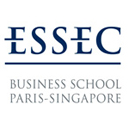Hello,
Following the advice of my colleague, Jean-Marie Choffray, professor of marketing at ESSEC, I've just read a text by Seneca about the shortness of life.
I found it very interesting in terms of investment and would like to share it with you.
jeudi, janvier 30 2014
Par Professeur Longin le jeudi, janvier 30 2014, 18:27 - Resources
Hello,
Following the advice of my colleague, Jean-Marie Choffray, professor of marketing at ESSEC, I've just read a text by Seneca about the shortness of life.
I found it very interesting in terms of investment and would like to share it with you.
lundi, juillet 16 2012
Par Professeur Longin le lundi, juillet 16 2012, 14:15 - Resources
Just a few words to introduce ESSEC Knowledge. This is the new on-line portal launched by ESSEC Business School in France. As explained by Radu Vranceanu (Director of ESSEC research center), the idea is to share the expertise of ESSEC researchers with a great number of readers interested in the topic of management, and shed new light on current issues.
What can we fiund on this website? Exclusive articles, videos, presentations, case studies, an online library, and a full range of digital tools, etc.
As an ESSEC professor, I am fully committed to this project. Researchers should try to reach a broad audience because the goal of research is to improve society. Note that such an apporach was put in practice by great professors like Milton Friedman who published many books for the general public. Personnally, I'll share with ESSEC Knowledge many of the materials available on this website:
Listen to Sarah Brown in the presentation video to know more about this project. Sarah who is the manager of ESSEC Knowledge, is the person to contact.
samedi, avril 28 2012
Par Professeur Longin le samedi, avril 28 2012, 21:18 - Research
Please find below my personal thoughts about academic research in Social Sciences.
What about academic research?
Research is business
Research is a business like any business. Research articles written by professors are just products and as every product, it has to be produced, distributed and most importantly sold (if not bought). The distribution of research articles traditionally ranged from conferences to publications in books and journals; nowadays, the internet is also becoming more and more important to promote research. The selling of research corresponds to the impact of research articles and is measured by the number of citations. Nowadays, Google Scholar, by publicizing information about research works, has become the yardstick for measuring research impact.
Money and incentives for researchers should be on the production side, on the distribution side and on the selling side as well.
Research in rankings
Rankings of academic institutions are mainly based on research. Let’s take two examples: the Shanghai ranking (academic ranking of world universities or ARWU) and the ranking of the well-respected Times Higher Education review. The methodology used to rank institutions clearly focuses on the quality of research and especially on the impact of research.
The criteria of Shanghai ranking used to rank institutions in the category Social Sciences are the following:
The criteria of the ranking by the Times Higher Education review used to rank institutions in the category Social Sciences are the following:
These rankings clearly show that beyond publications, it is the quality of research and more importantly the impact of research that is taken into account. For Shanghai’s ranking, 75% of the criteria are based on the impact of research (Nobel Prizes, highly cited researchers and citations). In the ranking of the Times Higher Education review, a published and cited article has 8 times more impact than an article which is not cited but only published (even in an excellent review).
I believe that these rankings (especially Shanghai ranking) will play a more and more important role in the future by differentiating academic institutions. Academic institutions that will be (well) ranked will have a strong competitive advantage.
Research incentives for the 21st century
In order to improve research performance, I propose the following:
On the production side
On the distribution side
On the selling side
lundi, septembre 19 2011
Par Professeur Longin le lundi, septembre 19 2011, 05:32 - Training
Patrimonia is the exhibition for professionals in the wealth management area. It takes place in Lyon on September 29 and 30 2011. Every year it gathers professionals such as financial advisors, investment bankers, real estate managers… ESSEC will be at Patrimonia to present its wealth management program for professionals. You can visit ESSEC at the stand E33.
ESSEC wealth management program is meant for financial advisers working in the asset management and wealth management areas. The program is composed of short seminars given on the ESSEC campus in La Defense (Paris business district). This feature enables participants to follow the program while continuing their full-time job activities. The program can also entitle graduating students to the ESSEC Wealth management certificate.
Examples of seminars offered: wealth management overview, legal and fiscal environment; real estate investment, bargaining and selling, and modern portfolio management techniques.
For more information please visit Patrimonia website and ESSEC Wealth management training website.


samedi, octobre 16 2010
Par Professeur Longin le samedi, octobre 16 2010, 22:35 - Mission statement
Sharing my knowledge and experience
by associating training, research and consulting
with internet leverage.
vendredi, octobre 15 2010
Par Professeur Longin le vendredi, octobre 15 2010, 23:38 - Mission statement
Sharing my knowledge in finance through training, research and consulting.
This is the objective of this website.
Subjects of interest are risk management and asset management for financial institutions, financial management for firms, and wealth management for individuals.
I'm going to post on this blog about what I think, read and do.